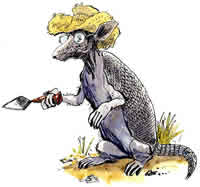Ask Dr. Dirt
Protecting the Past: Give a Hoot, Don't Loot! |
|
|
Q: Hi Dr. Dirt. Dig this: If I'm out riding my bike or walking somewhere, and I find a really cool artifact, can I take it home? A: You may find an arrowhead, a piece of pottery, or some other artifact that you think is really interesting, but taking it away from its home means that you're taking a piece of history. Once that home site is changed, it can't be put back together again. An artifact's position (where it's located) in a site gives important clues about its story. For instance, finding a sandal near some charred stones in a cave might tell you that the owner was preparing or eating dinner when he took his shoes off. If the shoe or stones were moved or stolen, the archeologist documenting the site may miss some important information about that person's life, like whether they had really huge feet! |
 |
Q: What if I want to give something I find to a museum?
A: It's better to let professional archeologists do that. A dig may involve both archeologists and trained volunteers working to carefully excavate a site. The whole area is studied, and detailed reports are made about the land and each artifact found. These reports help explain how the artifact was preserved over time, why it was left in that place, and what life was like at that time in that geographic area. Once an artifact is removed, moved or damaged, it can never be studied in the same way again.
Imagine that someone goes into your bedroom and, without asking, takes a few of your toys. Then they move your bed to a different wall, tear some pages from your books, and leave some of their belongings on the floor (if you have a little brother or sister, you probably know exactly how this feels). Without being able to ask you, it would be hard to know where things are supposed to go, what is missing, and which items don't belong to you. Unfortunately, when you study people that lived long ago, they are no longer around to help you understand their homes, their belongings, and their lives. Archeologists are trained to help tell the stories of the past. These stories are much harder to tell each time a clue is removed. Besides, everyone knows it's just as rude to steal from dead people as from live ones.
Q: Why should I even care about the past?
A: Because the past helps us know where we came from and what the future will be like. We know some amazing facts about human history from archeological discoveries. For instance, we're sorry to break the news to you, but Michael Jordan did not invent basketball. In fact, the ancient Mayans were playing a somewhat similar ball game complete with rubber ball and stone hoop over a thousand years ago. We know this from discovering their ball courts! Every time you flush the toilet, you should say thank you to the people of the ancient Indus civilization along the Indus River in what is today Pakistan. They created one of the first, almost-modern forms of indoor plumbing over 4,000 years ago! Today farmers in the tropical jungles of Mexico are learning to use ancient farming techniques that are much more productive and better for the environment than so-called "modern" farming practices. But the biggest reason you should care about the past is because knowing and caring about the human past is one of the unique things that sets us apart from the other living creatures on Earth. Only humans study and preserve part of their past, and this knowledge helps us make better choices about our future. So you see, it's very important to protect the past—not only can we learn to appreciate those that came before us, but we can get a lot of good ideas for tomorrow!
Q: This all seems like pretty major stuff. Are there laws for stealing artifacts or damaging sites?
A: Yes, there are stiff laws against looting (stealing) and vandalism (damaging) artifacts on public property—state and city land, parks, forests, and so on. People who break these laws face big fines—even jail time—when they are caught harming a site. These laws exist to protect important "cultural resources" so that they can be properly studied or just left alone and saved for future generations. Here in Texas, artifacts and sites on private land are not protected by law. Many landowners value knowledge about the past and protect the cultural resources on their property. Others do not and may intentionally destroy or dig up artifacts and sites just to get the "good stuff." This isn't against the law, but it's not a good idea. Just think, if everyone did that, we would lose many of our best clues to the past. Take the Alamo, for example. About 1900, that famous landmark was about to be destroyed to make way for more buildings in downtown San Antonio. If it wasn't for Clara Driscoll and the Daughters of the Republic of Texas, who stepped in and bought up the Alamo and surrounding properties, you wouldn't be able to visit it today!
Texas Beyond History
TBH WebTeam
1 October 2001
